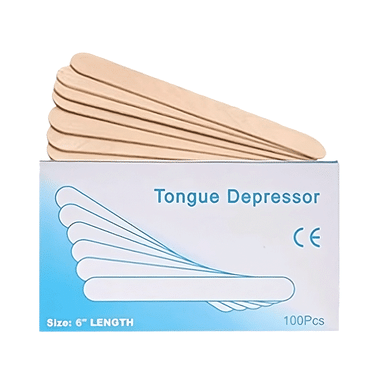Bos Medicare Surgical Sterile Standard Wooden Tongue Depressor
(100 devices in box)
Rs. 440
Rs. 450
2% off
Rs. 440
Rs. 450
2% off
Bos Medicare Surgical Sterile Standard Wooden Tongue Depressor
(100 devices in box)

Product Details
Bos Medicare Surgical Non-Sterile Standard Wooden Tongue Depressor helps depress the tongue during an examination of the mouth and throat. They can also be used as finger splints and for mixing and applying wax. After each use, tongue depressors should be cleaned with soap and water to remove any visible residue. They should then be sterilized to eliminate germs and bacteria. This can be done using an autoclave, which uses steam under pressure to sterilize medical instruments. Sterile wooden tongue depressors are made from high quality hardwood. They are mainly used in wound management and laboratory work, where completely sterilized materials are required. Disposable tongue depressors come in a pre-sterile pack and are discarded after one time use.
Uses:
These non-sterile wooden tongue depressors are widely used in medical and healthcare settings for depressing the tongue during oral examinations, allowing healthcare professionals to obtain clear views of the oral cavity.
Product specification and features:
Directions For Use:
Safety Information:
Uses:
These non-sterile wooden tongue depressors are widely used in medical and healthcare settings for depressing the tongue during oral examinations, allowing healthcare professionals to obtain clear views of the oral cavity.
Product specification and features:
- Standard size wooden tongue depressors
- Non-sterile, disposable design for single-use applications
- Smooth, splinter-free surfaces for patient comfort
- Versatile and cost-effective tool for medical practitioners
Directions For Use:
- Ensure the tongue depressor is clean and free of any visible defects
- Place the depressor on the patient's tongue to gently hold it down for oral examinations
- Dispose of the depressor after a single use
- Store in a clean and dry environment
Safety Information:
- Intended for single-use applications in medical and healthcare settings
- Non-sterile - do not use in sterile procedures or on open wounds
- Keep out of reach of children and untrained individuals
- Dispose of used depressors in accordance with healthcare waste management protocols
This product is non-returnable.












